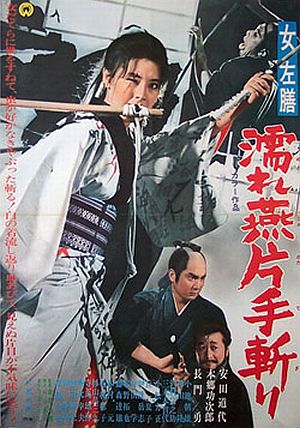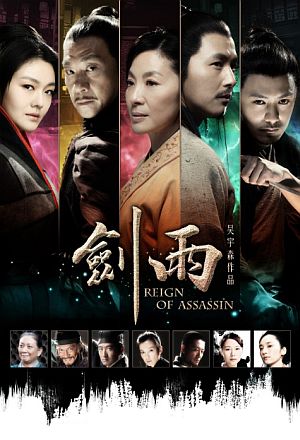★★★★½
“Depth perception? It’s vastly over-rated…”

 A sequel to One-Eyed One-Armed Swordswoman, this stands more than well enough on its own merits, with an interesting and complex storyline and engaging characters. As a young girl, Lady Sazen (Ohkusu) lost both an arm and her eye to the devilish Lord Daizen-dayu, who coveted the titular sword owned by her father. Sazen barely escaped with it and her life, and is now a wandering swordswoman, roaming the countryside. She saves a girl being chased by some thugs, and it turns out that she knows all the inside dirt on a corrupt priest, and he won’t stop until she has been silenced. Meanwhile, Daizen-dayu hasn’t given up on the sword, and has hired another samurai to get it from Sazen, bu any means necessary.
A sequel to One-Eyed One-Armed Swordswoman, this stands more than well enough on its own merits, with an interesting and complex storyline and engaging characters. As a young girl, Lady Sazen (Ohkusu) lost both an arm and her eye to the devilish Lord Daizen-dayu, who coveted the titular sword owned by her father. Sazen barely escaped with it and her life, and is now a wandering swordswoman, roaming the countryside. She saves a girl being chased by some thugs, and it turns out that she knows all the inside dirt on a corrupt priest, and he won’t stop until she has been silenced. Meanwhile, Daizen-dayu hasn’t given up on the sword, and has hired another samurai to get it from Sazen, bu any means necessary.
Dating from the end of the sixties, this is rather more restrained in terms of arterial spray than the genre would become in a few years, with Lone Wolf. But there’s still a brisk efficiency here, with Sazen needing no more than two strokes to finish off almost any opponent. It actually took me some time – well past her first fight – to realize she only was supposed to have one arm. I thought the whole “taking the scabbard off with her teeth” was a stylistic choice, not a necessity caused by a shortage of limbs; really, the term “disabled” was never less appropriate. Ohkusu is a very good heroine, smart and kind, yet absolutely ruthless when necessary.
However, it’s probably the plot that’s the strongest element in this, with the two main threads kept moving forward independently, until they finally cross over, for the final, blood-drenched reel. There’s twists and turns, with setbacks for both sides, and the political intrigue and corruption proves as tricky an opponent for Sazen as a pack of sword-wielding henchmen. Many of these films I’ve seen find it difficult to strike a balance between the dramatic and action elements, usually falling on one side or other. That isn’t the case here, and the result here comfortably kicks the arse of, say, either Lady Snowblood movie, and is among the best examples of period female chanbara I’ve seen.
Dir: Kimiyoshi Yasuda
Star: Michiyo Ohkusu
a.k.a. Lefty Fencer





 I find the line between “terrorist” and “freedom fighter” an interesting one, drawn not so much by any objective measure, but by the viewer’s perspective and historical hindsight. Qiu Jin is a good example: she fought against the perceived oppression – particularly of women – by the Qing dynasty in the early 20th century, and ended up getting publicly beheaded for her support of revolutionary factions, by the government of the time. Now? A heroine and a martyr, who has an official museum ‘n’ stuff. Funny how things work out.
I find the line between “terrorist” and “freedom fighter” an interesting one, drawn not so much by any objective measure, but by the viewer’s perspective and historical hindsight. Qiu Jin is a good example: she fought against the perceived oppression – particularly of women – by the Qing dynasty in the early 20th century, and ended up getting publicly beheaded for her support of revolutionary factions, by the government of the time. Now? A heroine and a martyr, who has an official museum ‘n’ stuff. Funny how things work out. To be honest, I have very little clue about what was going on here. Oh, the basics are clear enough. After losing their patriarch General Yang Zongbao (Ren) in battle, a noble family opts to send everyone out to the West to defend the realm from the usual invaders. They’re almost entirely female, but all possess significant ass-kicking ability, with their own particular weapon of choice. These are listed, in rapid order, near the start of the movie, and I’d suggest taking copious notes, because you won’t be able to recognize them otherwise: one armour-clad woman looks very much like another when they’re in battle. It’d probably have helped if they’d had a number on the back of their helmets or something. Hey, it’s not like this is a model of historical accuracy to begin with.
To be honest, I have very little clue about what was going on here. Oh, the basics are clear enough. After losing their patriarch General Yang Zongbao (Ren) in battle, a noble family opts to send everyone out to the West to defend the realm from the usual invaders. They’re almost entirely female, but all possess significant ass-kicking ability, with their own particular weapon of choice. These are listed, in rapid order, near the start of the movie, and I’d suggest taking copious notes, because you won’t be able to recognize them otherwise: one armour-clad woman looks very much like another when they’re in battle. It’d probably have helped if they’d had a number on the back of their helmets or something. Hey, it’s not like this is a model of historical accuracy to begin with. I could hear Chris’s eyes rolling when the title came up – I can’t blame her, as the viewing immediately followed Virgin Commandos, whose mere name sent her scurrying off to Facebook poker. This, however, was not the soft-porn flick she anticipated. Instead, it’s a comedy, somewhat spoofing Gladiator, but its closest cousin is likely Carry On Cleo. That said, it’s undeniably gynocentric, with the three heroines about the only competent characters on either side.
I could hear Chris’s eyes rolling when the title came up – I can’t blame her, as the viewing immediately followed Virgin Commandos, whose mere name sent her scurrying off to Facebook poker. This, however, was not the soft-porn flick she anticipated. Instead, it’s a comedy, somewhat spoofing Gladiator, but its closest cousin is likely Carry On Cleo. That said, it’s undeniably gynocentric, with the three heroines about the only competent characters on either side. The action is undeniably limited, being played more for laughs than excitement – the much-fabled ‘Celtic Kick’, turns out to be not quite what you think. Of course, this being British humour, there are also fart and willie jokes, but works because the characters have foibles and quirks to render them human. Smirgut has lost her inner warrior since motherhood; Dwyfuc is thoroughly unimpressed by the men available to her, and Worthaboutapig has long-standing self-esteem issues – unsurprisingly, really, given her name. The results are heroines who are likeable, as well as being brave and resourceful. I found the results very refreshing, with better-drawn characters than many bigger budget movies. That was definitely
The action is undeniably limited, being played more for laughs than excitement – the much-fabled ‘Celtic Kick’, turns out to be not quite what you think. Of course, this being British humour, there are also fart and willie jokes, but works because the characters have foibles and quirks to render them human. Smirgut has lost her inner warrior since motherhood; Dwyfuc is thoroughly unimpressed by the men available to her, and Worthaboutapig has long-standing self-esteem issues – unsurprisingly, really, given her name. The results are heroines who are likeable, as well as being brave and resourceful. I found the results very refreshing, with better-drawn characters than many bigger budget movies. That was definitely  Taking a minimalist approach to its plot, particularly for the first hour, it’s about Kotomi (Tsukui), who is on a quest to find the man (Kanai) who was responsible for killing her father (Nomura), a samurai who wanted to leave his sklls to her. To reach the killer, she has to battle her way through a series of lower-level minions, such as a pack of ninjas, a monk and Pocahontas [ok, that might be a stretch, but honestly, that was my first thought on seeing her]. However, after she has fought her way past these henchmen and henchwomen, to reach the boss
Taking a minimalist approach to its plot, particularly for the first hour, it’s about Kotomi (Tsukui), who is on a quest to find the man (Kanai) who was responsible for killing her father (Nomura), a samurai who wanted to leave his sklls to her. To reach the killer, she has to battle her way through a series of lower-level minions, such as a pack of ninjas, a monk and Pocahontas [ok, that might be a stretch, but honestly, that was my first thought on seeing her]. However, after she has fought her way past these henchmen and henchwomen, to reach the boss  Good to see Besson back in the director’s chair. Outside of the kids’ Arthur series, the only movie he personally helmed in the 2000’s was Angel-A, but Besson has been delivering action heroines for 20 years. Most obviously with the hugely-influential Nikita, but also in The Messenger and, to some extent The Fifth Element and Leon. Here, he goes back to just before the first World War, where journalist Adèle Blanc-Sec (Bourgoin) is kinda like a proto-Lara, whizzing around the globe in search of adventure. She heads to Egypt to grab the mummy belonging to Ramses’s physician: she’s been working with Prof. Ménard (Nahon), who has discovered how to bring the dead back to life, and wants to use the arcane knowledge the mummy possesses to help her sister, who has been in a coma for five years. But Ménard, unwilling to wait, tests his powers on a prehistoric egg: the resulting pterodactyl escapes from the museum where it is housed, and terrorizes Paris. Detective Caponi (Lellouche) is on that case…
Good to see Besson back in the director’s chair. Outside of the kids’ Arthur series, the only movie he personally helmed in the 2000’s was Angel-A, but Besson has been delivering action heroines for 20 years. Most obviously with the hugely-influential Nikita, but also in The Messenger and, to some extent The Fifth Element and Leon. Here, he goes back to just before the first World War, where journalist Adèle Blanc-Sec (Bourgoin) is kinda like a proto-Lara, whizzing around the globe in search of adventure. She heads to Egypt to grab the mummy belonging to Ramses’s physician: she’s been working with Prof. Ménard (Nahon), who has discovered how to bring the dead back to life, and wants to use the arcane knowledge the mummy possesses to help her sister, who has been in a coma for five years. But Ménard, unwilling to wait, tests his powers on a prehistoric egg: the resulting pterodactyl escapes from the museum where it is housed, and terrorizes Paris. Detective Caponi (Lellouche) is on that case… This unofficial spin-off from the Zatoichi series had us wondering if there’s a Japanese studio version of The Asylum out there – the people who specialize in knockoffs of popular films, including such classics as Snakes on a Train and Sunday School Musical. We’ll cut the makers of this some slack, since we’re of the opinion that all action films are improved with a heroine in the lead. That’s the main switch here: Zatoichi becomes Ichi (Ayase), a blind swordswoman and entertainer, who is roaming the country in search of the man she believes is her father. She is quite capable of taking care of herself, but the resulting trail of bodies is blamed on travelling companion Tomo Fujihira (Ôsawa), who becomes bodyguard to a town under assault from a gang, led by Banki (Nakamura). Unfortunately, since he accidentally blinded his mother, Tomo is unable to pull his sword from its scabbard, and the Banki gang are ready to wreak revenge on him for the members killed by Ichi.
This unofficial spin-off from the Zatoichi series had us wondering if there’s a Japanese studio version of The Asylum out there – the people who specialize in knockoffs of popular films, including such classics as Snakes on a Train and Sunday School Musical. We’ll cut the makers of this some slack, since we’re of the opinion that all action films are improved with a heroine in the lead. That’s the main switch here: Zatoichi becomes Ichi (Ayase), a blind swordswoman and entertainer, who is roaming the country in search of the man she believes is her father. She is quite capable of taking care of herself, but the resulting trail of bodies is blamed on travelling companion Tomo Fujihira (Ôsawa), who becomes bodyguard to a town under assault from a gang, led by Banki (Nakamura). Unfortunately, since he accidentally blinded his mother, Tomo is unable to pull his sword from its scabbard, and the Banki gang are ready to wreak revenge on him for the members killed by Ichi. The most disappointing film of 2010? I went in with huge expectations, based on reviews that said, “The best swordplay film since Crouching Tiger, Hidden Dragon..” O RLY? I know Crouching Tiger. Crouching Tiger is one of my favourite movies. And Reign of Assassins, you’re no Crouching Tiger. It’s a confused, poorly-shot mess that proved a struggle to endure and a challenge to stay awake, right from the opening lump of introduction. Stick with me for this synopsis. The remains of a Buddhist monk, split in two, are said to turn whoever has them into a kung-fu master. The Dark Stone gang, under the Wheel King (Wang), want to possess them, and get one half, but gang member Drizzle makes off with the body parts, undergoes plastic surgery that turns her into Michelle Yeoh and takes up a quiet life as a fabric seller. She meets and marries Jiang Asheng (Jung), until her secret identity is revealed in a bank raid, and the Dark Stone gang come after her again. However, turns out Jiang isn’t who he seems either…
The most disappointing film of 2010? I went in with huge expectations, based on reviews that said, “The best swordplay film since Crouching Tiger, Hidden Dragon..” O RLY? I know Crouching Tiger. Crouching Tiger is one of my favourite movies. And Reign of Assassins, you’re no Crouching Tiger. It’s a confused, poorly-shot mess that proved a struggle to endure and a challenge to stay awake, right from the opening lump of introduction. Stick with me for this synopsis. The remains of a Buddhist monk, split in two, are said to turn whoever has them into a kung-fu master. The Dark Stone gang, under the Wheel King (Wang), want to possess them, and get one half, but gang member Drizzle makes off with the body parts, undergoes plastic surgery that turns her into Michelle Yeoh and takes up a quiet life as a fabric seller. She meets and marries Jiang Asheng (Jung), until her secret identity is revealed in a bank raid, and the Dark Stone gang come after her again. However, turns out Jiang isn’t who he seems either… Lili is a devotee of Sayama Hashinryu, a deadly form of swordsmanship passed down from woman to woman. She goes through the initiation rite, which involves being blindfolded and given a drink which knocks her unconscious. She comes to, about three hundred years in the past, in feudal Japan, naked. When she gathers her senses, she rescues a local village-girl from some ninjas, but to cut a long story short, discovers in the process that when Lili exposes her breasts, they emit a pinkish glow, and she becomes far better at swordplay. Turns out the poor villagers are suffering extortion from the evil Lady Okini (Asa), so Lili turns into the Magnificent One [or Magnificent Two, if you know what I mean, and I think you do], while also falling for Hikoichi (Matsuda), the brother of the girl she rescued. However, it turns out that Lili is not the only one in possession of a supernatural bosom; Lady Okini is also so equipped. Battle cleavages are thus drawn…
Lili is a devotee of Sayama Hashinryu, a deadly form of swordsmanship passed down from woman to woman. She goes through the initiation rite, which involves being blindfolded and given a drink which knocks her unconscious. She comes to, about three hundred years in the past, in feudal Japan, naked. When she gathers her senses, she rescues a local village-girl from some ninjas, but to cut a long story short, discovers in the process that when Lili exposes her breasts, they emit a pinkish glow, and she becomes far better at swordplay. Turns out the poor villagers are suffering extortion from the evil Lady Okini (Asa), so Lili turns into the Magnificent One [or Magnificent Two, if you know what I mean, and I think you do], while also falling for Hikoichi (Matsuda), the brother of the girl she rescued. However, it turns out that Lili is not the only one in possession of a supernatural bosom; Lady Okini is also so equipped. Battle cleavages are thus drawn…